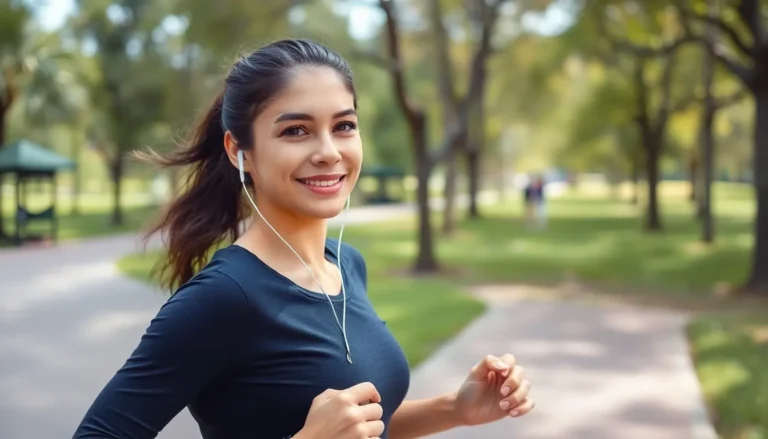In a world where counting sheep just isn’t cutting it, sleep tracking wearables have swooped in to save the night. These nifty gadgets don’t just help you fall asleep; they turn you into a sleep detective, unraveling the mysteries of your nightly adventures. Ever wondered why you wake up feeling like a zombie? Spoiler alert: it might not be your choice of late-night snacks.
Table of Contents
ToggleOverview of Sleep Tracking
Sleep tracking technology has gained prominence, offering valuable insights into user sleep patterns. These wearables utilize sophisticated sensors to monitor various factors, including heart rate, movement, and the phases of sleep. Effective tracking enables users to understand their sleep cycles and duration.
Data collected from sleep tracking wearables provides users with a comprehensive overview of their nightly rest. Information on sleep quality helps identify disruptions in sleep, such as waking during the night or experiencing restlessness. Armed with this knowledge, users can make informed decisions to improve their sleep hygiene.
Many devices also offer personalized feedback based on the data collected. This feedback may include suggestions for bedtime routines or lifestyle adjustments that promote better sleep. For instance, a device might recommend reducing screen time or adjusting sleeping environments.
Sleep tracking wearables can connect with mobile applications, allowing users to visualize their sleep data over time. Users track trends in their sleep patterns and correlate them with daily activities, such as exercise or dietary habits. This connection fosters a better understanding of the overall impact of lifestyle choices on sleep quality.
Some popular sleep tracking wearables feature advanced algorithms that adapt to individual sleep patterns. They utilize machine learning to enhance accuracy in tracking and predicting sleep needs. Through consistent use, wearables refine their insights, becoming increasingly personalized for the user.
Sleep tracking technology presents invaluable resources for enhancing sleep quality. The integration of data and personalized insights empowers users to optimize their nightly routines effectively.
Importance of Sleep Tracking
Sleep tracking plays a crucial role in understanding individual sleep habits. By leveraging data, users can make informed decisions about improving their rest.
Benefits of Monitoring Sleep
Monitoring sleep provides essential insights into overall health. Identifying patterns helps users understand their sleep cycles. Recognizing disruptions allows for timely adjustments, promoting better sleep hygiene. Improved awareness facilitates healthier lifestyle choices, such as diet and exercise. Achieving adequate sleep has connections to enhanced mood, productivity, and cognitive function. Engaging in regular monitoring also aids in detecting potential sleep disorders, enabling early intervention.
How Wearables Enhance Sleep Quality
Wearables enhance sleep quality through real-time data collection and analysis. These devices monitor heart rate, movement, and sleep phases with precision. Providing personalized feedback helps users align their routines to optimize sleep. Many products utilize advanced algorithms for tailored recommendations based on specific sleep patterns. Integrating sleep data into mobile applications visualizes trends, allowing users to track improvements over time. Promoting better sleep habits becomes easier with insights drawn from historical data and daily activities.
Best Wearables for Sleep Tracking
Wearables for sleep tracking come in various forms, each offering unique features for monitoring and improving sleep. Both smartwatches and fitness trackers help users gain insights into their sleep patterns while specialized sleep devices focus on providing detailed analysis.
Smartwatches
Smartwatches combine functionality with sleep tracking features. Many models include heart rate monitoring, movement tracking, and sleep phase recognition. Apple Watch and Samsung Galaxy Watch provide extensive sleep insights through their health applications. These devices often sync with mobile apps, enabling users to visualize sleep data and identify trends. Adjustments based on sleep quality help users develop healthier sleep habits over time.
Fitness Trackers
Fitness trackers serve as lightweight, unobtrusive options for tracking sleep. Devices like Fitbit Charge and Garmin Vivosmart monitor sleep stages and duration, offering detailed reports on overall sleep quality. Most trackers incorporate silent alarms, waking users gently during lighter sleep stages. Insights gained from sleep data guide users to optimize their bedtime routines, leading to improved rest. Integration with fitness metrics reinforces the correlation between physical activity and sleep quality.
Specialized Sleep Devices
Specialized sleep devices offer in-depth monitoring specifically designed for enhancing sleep quality. Products such as the Oura Ring and Sleep Tracker are equipped with advanced sensors to measure parameters like breathing rate and skin temperature. These devices provide actionable insights, with personalized recommendations for improving sleep hygiene. Some models connect to smart home devices, adjusting environmental factors like lighting and temperature. Their targeted analytics empower users to make informed choices for better sleep.
Features to Consider
When choosing a wearable for sleep tracking, several essential features enhance the overall experience and effectiveness of sleep monitoring. Focus on these critical aspects to ensure optimal functionality.
Accuracy of Sleep Data
Accuracy plays a crucial role in sleep tracking wearables. Devices equipped with advanced sensors can provide precise measurements of sleep stages and duration. Wearables that utilize heart rate variability and motion sensitivity generally offer more detailed insights into sleep patterns. Individuals appreciate devices that adapt through machine learning, improving data accuracy over time. Ideally, consumers should look for wearables that deliver evidence-backed reports to make informed decisions based on their sleep quality.
Battery Life and Comfort
Battery life significantly impacts a wearer’s experience. Devices with long-lasting batteries can usually track sleep without interruptions, supporting seamless overnight monitoring. Comfort also matters; options like lightweight bands or rings can enhance usability during sleep. Ultimately, choosing a device that balances battery longevity with comfort promotes consistent use and reliable data collection. Sleepers benefit from uninterrupted tracking, allowing them to gather precise information about their nightly rest.
App Compatibility and Integration
App compatibility increases the value of sleep tracking wearables. Effective devices typically integrate with user-friendly apps that visualize sleep data and offer personalized insights. Many wearables connect with smart home devices, facilitating adjustments to the sleep environment. Users consider wearables that support data sharing with other health and fitness apps, enhancing overall tracking accuracy. Comprehensive app integration encourages users to engage with their sleep data actively, fostering better sleep habits and routines.
Investing in a quality sleep tracking wearable can significantly enhance one’s understanding of sleep patterns and overall health. With the ability to monitor various factors like heart rate and movement these devices provide valuable insights that empower users to make informed decisions about their sleep hygiene.
By leveraging personalized feedback and data visualization many wearables not only help in identifying sleep disruptions but also promote healthier lifestyle choices. As technology continues to evolve the best wearables for sleep tracking will only become more accurate and user-friendly making it easier to achieve better rest and improved well-being.



